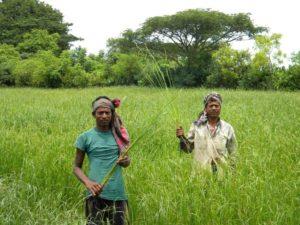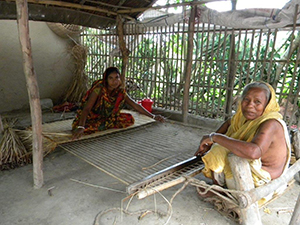Every year, the International Day for Disaster Reduction is celebrated on October 13th. This year, we chose to mark the occasion by highlighting two of our projects in Bangladesh. These activities seek to help farmers adapt to the natural disasters which occur so frequently in the country.
Through a series of training sessions, funded by DFID (UK Aid), the farmers learnt to better adapt their techniques, and acquired more efficient approaches to fertiliser use. As one of them says, “With SOLIDARITÉS INTERNATIONAL, we learnt how to sow rice in lines rather than randomly, and when is the best time to sow. These new techniques have helped us increase our production rates by the square metre, and have helped us reduce the amount of fertiliser we use. As a result, I’ll spend 2000 takas (20 euros) less on fertilizer and I’ll be able to grow two extra bags of rice. So I’ll spend less to produce more.“
As one of them says, “With SOLIDARITÉS INTERNATIONAL, we learnt how to sow rice in lines rather than randomly, and when is the best time to sow. These new techniques have helped us increase our production rates by the square metre, and have helped us reduce the amount of fertiliser we use. As a result, I’ll spend 2000 takas (20 euros) less on fertilizer and I’ll be able to grow two extra bags of rice. So I’ll spend less to produce more.“
A way to increase revenue, even during low season

With a view to limiting the impact of future risks related to salinity and flooding, SOLIDARITÉS INTERNATIONAL has also worked with local agricultural departments to encourage the cultivation of more resistant crops, such as ‘mele’ (a local reed). This long-term project – funded by the European Commission (DIPECHO) – seeks to help develop the capacity of these departments to provide advice and support to communities carrying out projects which aim to reduce the economic impact of climate change.
“Part of our land is now devoted to growing mele, explain some farmers who have benefited from the project. Although it’s inedible, it’s a very resistant crop and can be used not only to feed animals but to weave mats which we can then sell. Even better, we can continue these activities during low season, when it’s impossible to carry out our agricultural work. Above all, it’s a new way for us to earn money. ”
Bangladesh
Context and action- 165.65 million inhabitants
- 129th out of 191 countries on the Human Development Index
- 29.780 people helped

